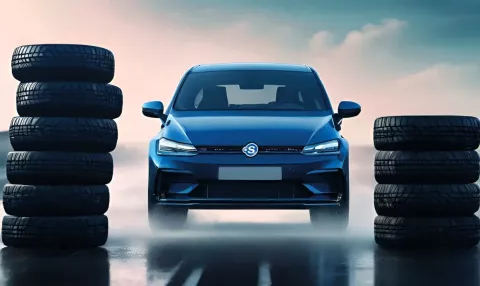Nitrogen in tyres: definition, benefits and tip
Nitrogen tyre inflation is the process of filling tyres with nitrogen gas instead of air. This method of tyre inflation is becoming increasingly popular as it offers several benefits compared to traditional air inflation. In this article, we will discuss the definition of nitrogen tyre inflation, the benefits it offers and useful tips for tyre owners.

What does nitrogen tyre inflation mean?
Nitrogen tyre inflation is the process of filling a tyre with nitrogen instead of compressed air. Nitrogen is a more inert gas, meaning that it won’t expand or contract as much as compressed air when temperatures change. This can result in more consistent tyre pressure, improved fuel efficiency, and extended tyre life.
Also, nitrogen molecules are larger than oxygen molecules and therefore leak out of tyres at a slower rate, meaning tyres stay inflated for longer and are less susceptible to pressure changes caused by temperature changes.
Is nitrogen better than air for tyre inflation?
Nitrogen tyre inflation has become more popular in recent years, prompting many drivers and car owners to ask if nitrogen is better than air for tyre inflation. Nitrogen has several advantages over air, including a more consistent pressure throughout its lifetime and better resistance to temperature changes.
However, air-filled tyres are nothing but a bad solution! Refilling your under-inflated tyres with compressed air is often a free service. We recommend to regularly check your tyre pressure so that your road handling and fuel consumption are optimized. Refer to your car handbook or on the pressure label on the inside of the driver’s door or fuel cap to get the recommended pressure levels for front and rear tyres.
What are the benefits of nitrogen tyre inflation for your car?
Filling your tyres with nitrogen has a few benefits for your car's efficiency and tyre performances:
- Thanks to nitrogen's attributes, your tyres will lose pressure more slowly than if filled with compressed air.
- With less pressure lost, your tyres can have an extended lifespan.
- With less pressure lost thanks to nitrogen stability, you tyre pressure will be more constant and thus your fuel consumption will be improved. It means that your car will require less energy to move. This can also lower your car's CO2 emissions.
- The road holding and grip will be improved, as the pressure will be more constant and will stay at the correct level longer than with compressed air.
- As nitrogen is a dry gas, your wheels may get less corrosion. Indeed, as compressed air contains water vapor, it may result in wheel corrosion. Also, it will prevent your TPMS (Tyre Pressure Management System) to corrode.
Can I add air to nitrogen filled tyres?
If you filled your tyres with nitrogen and need to top it off with air, it will work! Indeed, adding compressed air to a nitrogen-filled tyre will not harm it. The only effect it will have is lowering nitrogen effectiveness, as it will be less pure.
So, mixing nitrogen with compressed air is not dangerous. Driving with under-inflated tyres must be avoided. If you need a pressure refill on your nitrogen-inflated tyres, do not hesitate to top if off! Having the tight tyre pressure is the best way to ensure your security and make fuel economy.
Where can I get nitrogen inflation in India?
Your local Point S branch can perform nitrogen inflation for your tyres! Check all of our tyres services and get in touch with our expert technicians to have your tyres maintained. No stress with Point S!

